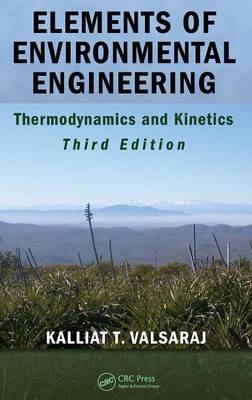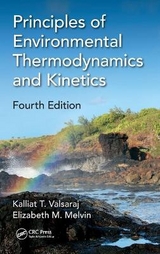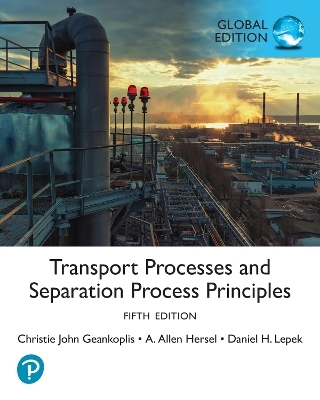
Elements of Environmental Engineering
Crc Press Inc (Verlag)
978-1-4200-7819-0 (ISBN)
- Titel erscheint in neuer Auflage
- Artikel merken
Revised, updated, and rewritten where necessary, but keeping the clear writing and organizational style that made previous editions so popular, Elements of Environmental Engineering: Thermodynamics and Kinetics, Third Edition contains new problems and new examples that better illustrate theory. The new edition contains examples with practical flavor such as global warming, ozone layer depletion, nanotechnology, green chemistry, and green engineering. With detailed theoretical discussion and principles illuminated by numerical examples, this book fills the gaps in coverage of the principles and applications of kinetics and thermodynamics in environmental engineering and science.
New topics covered include:
Green Chemistry and Engineering
Biological Processes
Life Cycle Analysis
Global Climate Change
The author discusses the applications of thermodynamics and kinetics and delineates the distribution of pollutants and the interrelationships between them. His demonstration of the theoretical foundations of chemical property estimations gives students an in depth understanding of the limitations of thermodynamics and kinetics as applied to environmental fate and transport modeling and separation processes for waste treatment. His treatment of the material underlines the multidisciplinary nature of environmental engineering.
This book is unusual in environmental engineering since it deals exclusively with the applications of chemical thermodynamics and kinetics in environmental processes. The book’s multimedia approach to fate and transport modeling and in pollution control design options provides a science and engineering treatment of environmental problems.
Louisiana State University, Baton Rouge, USA
Introduction
Energy, Population, and Pollution
Environmental Standards and Criteria
The Discipline of Environmental Engineering
Chemical Thermodynamics and Kinetics in Environmental
Engineering
Units and Dimensions
Structure of the Book
References
Basic Chemical Thermodynamics
Equilibrium
Fundamental Laws of Thermodynamics
Chemical Equilibrium and Gibbs Free Energy
Concept of MaximumWork
Gibbs Free Energy and Chemical Potential
Thermodynamics of Surfaces and Colloidal Systems
Problems
References
Multicomponent Equilibrium Thermodynamics
Ideal and Nonideal Fluids
Fugacity
Ideal Solutions and Dilute Solutions
Nonideal Solutions
Adsorption on Surfaces and Interfaces
Problems
References
Applications of Equilibrium Thermodynamics
Air–Water Phase Equilibrium
Air–Water Equilibrium in Atmospheric Chemistry
Soil–Water and Sediment–Water Equilibrium
Biota/Water Partition Constant (Bioconcentration Factor)
Air-to-Aerosol Partition Constant
Air-to-Vegetation Partition Constant
Adsorption on Activated Carbon forWastewater Treatment
Problems
References
Concepts from Chemical Reaction Kinetics
Progress Toward Equilibrium in a Chemical Reaction
Reaction Rate, Order, and Rate Constant
Kinetic Rate Laws
Activation Energy
Reaction Mechanisms
Reactions in Solutions
Environmental Catalysis
Redox Reactions in Environmental Systems
Environmental Photochemical Reactions
Enzyme Catalysis
Problems
References
Applications of Chemical Kinetics in Environmental Systems
Types of Reactors
TheWater Environment
The Air Environment
Soil and Sediment Environments
Applications of Chemical Kinetics in Environmental
Bioengineering
Applications in Green Engineering
Problems
References
Appendix 1: Properties of Selected Chemicals of Environmental Significance
Appendix 2: Standard Free Energy, Enthalpy, and Entropy of Formation for Compounds
of Environmental Significance
Appendix 3: Selected Fragment (bj) and Structural Factors (Bk) for Octanol–Water Partition Constant Estimation
Appendix 4: Concentration Units for Compartments in Environmental Engineering
Appendix 5: Dissociation Constants for Environmentally Significant Acids and Bases
Appendix 6: Bond Contributions to Log Kaw for the Meylan and Howard Model
Appendix 7: Regression Analysis (the Linear Least-Squares Methodology)
Appendix 8: Error Function and Complementary Error Function Definitions
Appendix 9: Cancer Slope Factor and Inhalation Unit Risk for Selected Carcinogens
Appendix 10: U.S. National Ambient Air Quality Standards
Index
| Erscheint lt. Verlag | 10.6.2009 |
|---|---|
| Zusatzinfo | Over 500; 79 Tables, black and white; 144 Illustrations, black and white |
| Verlagsort | Bosa Roca |
| Sprache | englisch |
| Maße | 156 x 234 mm |
| Gewicht | 794 g |
| Themenwelt | Technik ► Umwelttechnik / Biotechnologie |
| ISBN-10 | 1-4200-7819-4 / 1420078194 |
| ISBN-13 | 978-1-4200-7819-0 / 9781420078190 |
| Zustand | Neuware |
| Informationen gemäß Produktsicherheitsverordnung (GPSR) | |
| Haben Sie eine Frage zum Produkt? |
aus dem Bereich



